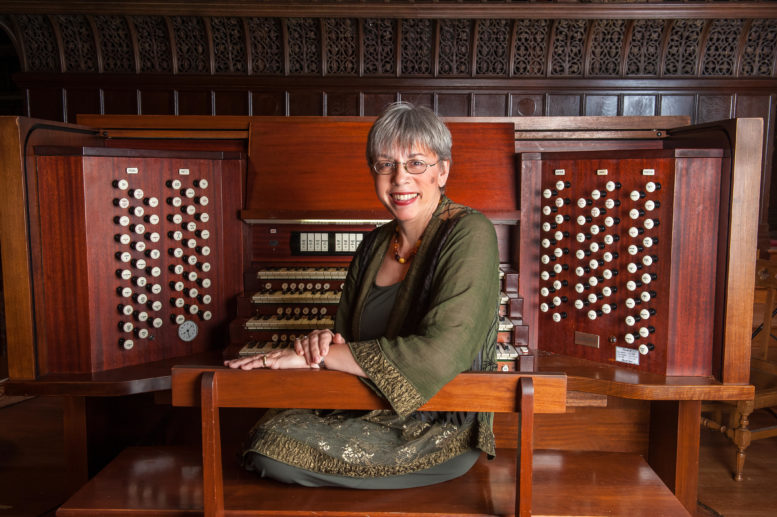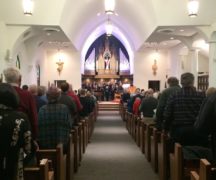By DAVID DUPONT
BG Independent News
Organist Gail Archer visited Ukraine in 2015 years before the current war broke out.
The concert was part of her mission to promote the organ music, especially contemporary organ music, from Eastern Europe. She has also recorded Russian organ works and music from Poland.
In 2018 back in Ukrainian, Archer recorded a set of contemporary music for organ written by Ukrainian composers. That music now carries greater resonance as people turn their attention the war-torn republic, now under siege by the Russian government.
Archer will perform a selection of those works in a concert Saturday, Nov. 12 at 7:30 p.m. at Zoar Lutheran Church, 314 N. Indiana Ave., Perrysburg. Visit ZoarLutheran.com or call 419-874-4336 for more information on the free concert.
“So many of us are deeply concerned about the situation in Eastern Europe,” Archer said. “This is a way to draw attention to the plight of the Ukrainian people, and I’m happy to do that.”
Her interest goes further back.
“I traveled in Ukraine starting in 2015, and I got interested in the organ culture there,” Archer said. She was surprised by the number of organs. Often, she said, an orchestra will share an organ with a church. She also discovered “a keen culture of new organ composition.”
Friends in Lviv and Odessa helped her gather a large number of Ukrainian organ pieces. She then played through them and selected those she wished to concentrate on.
Then in 2018 she went to the Romanian Catholic Church in Chernivtsi and recorded the program.
The resulting album released in summer 2020 was fittingly titled “Chernivtsi: Contemporary Ukrainian Organ Music.” The album, Archer said, has received “lovely” reviews in a number of prominent journals, as have her other recordings of Eastern European work. “People have noticed that I’m doing something distinctive,” Archer said.
“I’ve been concentrating on Eastern European organ music,” the performer said. Few in the United States and Western Europe know that “there’s a rich culture of organ composition in Eastern Europe. So, I am making this my mission to shed light on the beauty of their tradition. It deserves to be played.”
The folk music of the region casts a strong influence on the classical music. The music is imbued with “these irregular, spikey rhythms. Things that are unexpected,” she said. “The music is very irregular and that is what’s attractive about it – it’s unpredictable.”
The melodies are based on Eastern scales with unusual turns of phrase. “It presents many challenges to the player.”
Archer is a college organist at Vassar College, where she has established an organ studio. She is also a faculty member of Harriman Institute of Columbia University, and director of the music program at Barnard College, Columbia University, where she conducts the Barnard-Columbia Chorus and Chamber Singers.
Archer credits her parents with her love of organ. She comes from a family of churchgoers, she said. “I was exposed to that music from the time I was very young.”
She started playing piano and singing in church choir when she was 8. As she entered her teens and her legs grew long enough, it was natural for her to gravitate to the organ.
Playing the organ is a matter of constant problem solving. Every organ and every venue is different, Archer said. “I really enjoy figuring out the best sound.”
As she settles in with a new organ, she has to figure out not only the specific capabilities of the instrument, but also the acoustics of the venue. Is the space too dry or too resonant? “You have to adjust your registrations to suit that space, so people who come can actually enjoy what you’re doing. You can overwhelm your listeners.”
Recently she did a pair of concerts in Pennsylvania playing the same program of Polish organ music. One was in a small church with a small organ, and the other was a grand organ with three manuals in a cathedral in Scranton. Same music, but very different organs.
“You’re adjusting to bring out the best in the space and the instrument, and that’s part of being an organist. You are problem solving as soon as you sit down at the organ.”
Archer also takes great care in the programming of a concert.
In Perrysburg, in addition to the Ukrainian works, she will play two pieces each by Bach and Brahms, and then close the recital with a set of compositions by two 20th century French women composers, Nadia Boulanger and Jeanne Demessieux.
“I make sure my programs have variety between the more robust pieces and the more introspective reflective pieces. You need to give people some sonic rests. You’re not there to impress them with how fast and loud you can play for an hour. That’s not the height of the art. You have to have a wide range of mood and spirit.”


